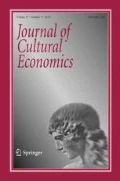Abstract
The paper is concerned with the issue of whether international copyright legislation is effective in curbing audio software counterfeiting. The paper finds that copyright conventions have not been effective in reducing audio counterfeiting to comparatively low levels. This result holds even when allowances are made for the duration of copyright convention membership and the specificity of the articles of the convention. Economic development is found to be the main determinant of low counterfeit levels. This would tend to support anecdotal evidence which indicates that economic development is a necessary condition for the active recognition of audio property rights by the general public, judiciary and police. It is also consistent with a view that pirate audio software, being an inferior good, has a more buoyant market in less developed economies. From a policy perspective the research would seem to suggest that the extensive efforts and copious attention to detail by legal experts has made little impact on counterfeit activity and is secondary in importance to the socio-economic environment in which these laws are being applied.
Similar content being viewed by others
References
Alloway, N. (1983) “Activities and Achievements”, in John Borwick (ed.), The First Fifty Years: Celebrating the Fiftieth Anniversary of the IFPI. IFPI, London, pp. 7–13.
Burke,.E. (1995) “The Dynamics of Product Differentiation in the British Record Industry”, Trinity Economic Papers, Technical Paper No. 1, March 1995, Trinity College, Dublin and also forthcoming in the Journal of Cultural Economics.
Carr, J. (1987) “Turkey: The Tide is Turning”, 20 Years of Record Piracy. Billboard, January 24, 1987.
Davies, G. (1991) “Digital Audio Tape and New Technology”, IFPI 1991 Review: The Challenge of the 1990s. IFPI, London.
IFPI (ed.), (1987) “20 Years of Record Piracy”, Billboard, January 24, 1987.
IFPI (1990) “International Conventions and Copyright/Neighbouring Rights Legislation”, IFPI, London.
IFPI (1991a) “Anti-Piracy News”, IFPI for the Record 9(3), June/July, London.
IFPI (1991b) “IFPI 1991 Review: The Challenge of the Nineties”, IFPI, London.
IFPI (1991c) “New Deal on Digital Technology”, IFPI Press Information, July 12, 1991.
IFPI (1991d) “New Deal on Digital Technology Reached in the United States”, IFPI Press Information, September/October 1991.
Solleveld, C. (1983) “From Depression to Digital”, in John Borwick (ed.), The First Fifty Years: Celebrating the Fiftieth Anniversary of the IFPI. IFPI, London.
Stewart, S. (1983) “The Years from 1969-1979”, in John Borwick (ed.), The First Fifty Years: Celebrating the Fiftieth Anniversary of the IFPI. IFPI, London.
Author information
Authors and Affiliations
Rights and permissions
About this article
Cite this article
Burke, A.E. How effective are international copyright conventions in the music industry?. J Cult Econ 20, 51–66 (1996). https://doi.org/10.1007/s10824-005-1060-z
Issue Date:
DOI: https://doi.org/10.1007/s10824-005-1060-z




